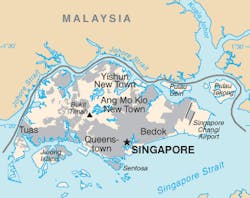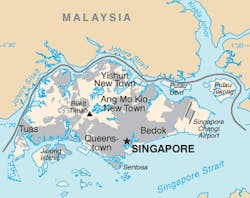Electrochemical desalination demo plant to be delivered by Evoqua in Singapore
Singapore’s national water agency PUB has contracted Evoqua Water Technologies to build a new 2270 m3/day desalination demonstration facility in Tuas, Singapore.
The new desalination plant will use Evoqua’s Nexed electrochemical desalination module technology.
Electrodialysis is a membrane process in which ions are transported through selective ion permeable membranes from one solution to another, under the influence of an electrical potential gradient.
Alternating ion selective membranes (anionic and cationic) can be configured to create separated streams of purified and concentrated water.
With support from the Singapore Economic Development Board (EDB), through the TechPioneer piloting programme, Evoqua will design and construct an adjacent one feed plant with the planning phase beginning this month.
Staged increases in flow rate will be achieved through 2017 after the first 90 m3/hr feed flow system is installed in mid-2016.
The Nexed module technology includes tuneable dissolved solids removal capability, which Evoqua said will allow “new options for significantly reduced energy use, costs and facility footprint”.
Harry Seah, chief technology officer, PUB, said: “R&D is vital as we continue to ensure a sustainable water supply for the future. With rising energy costs, we are looking into ways to reduce the energy consumed during desalination. This is important as desalination will meet up to 25% of our water needs by 2060.”
Ron Keating, CEO of Evoqua Water Technologies, said: “We think of this technology as a ‘de-salting engine’ and can be applied to a wide range of uses, including sea and brackish water, variable salinity applications and water re-use options."
###
Read/Watch more

